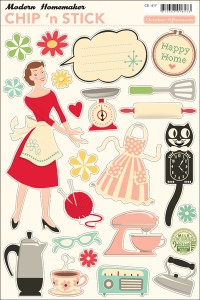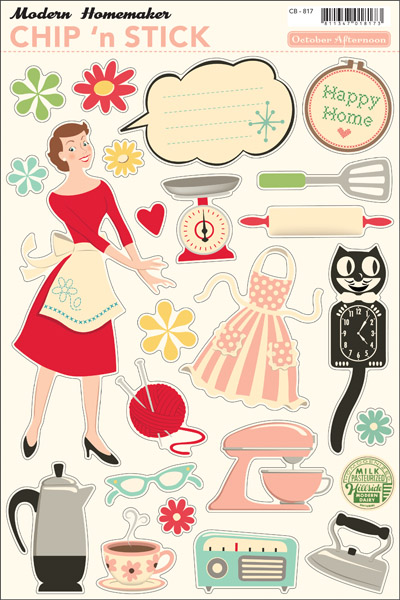by Suchitra Ramachandran
[box]We praise housewives – we even call them ‘homemakers’ – because we know it’s no easy task to run a home. But have we ever thought of how leaving homemaking to women might be problematic and unfair – and not just for women? Suchitra Ramachandran explains.[/box]We have heard it all: “Being born a woman is great, because you get to be a nurse, teacher, cook and cleaner all rolled into one”, “Sacrifice is the hallmark of womanhood” and “Don’t be ashamed of being a housewife, it’s not easy.” These statements get passed around over and over, by women, by men, in popular culture and in social media. They glorify women who are keepers of home and hearth, women who are not career aspirational but prefer to stay at home.
Let’s start out by agreeing on something. Housework, like all work, is not easy. The women who do this on a day-to-day basis, definitely do a great job. So what is wrong with these statements congratulating these women? The trouble is, they tend to emphasize not the difficulty of work per se, nor the skill of the women, but simply the fact that women opt to do it – because many men cannot think of opting to do it, or of giving up their career for this. These congratulatory yet consolatory statements commend women who keep the household going strong by ‘sacrificing’ their lives so that the family structure and social structure can be strong. These messages do not admire women for doing hard work, but admire them for doing their supposed duty. They don’t glorify housework, they glorify housewives.
Let me tell you three reasons why I find this attitude problematic. Reverentially congratulating a woman who agrees to be a housewife is in the same tone as congratulating somebody who volunteers to sacrifice themselves so that the village could have rain. It is this notion of sacrifice, imposed as a duty on women, that is not good. What do children learn when such platitudes are thrown around? That “sacrifice is a woman’s hallmark”? What about the rest of us who have no willingness to sacrifice our aspirations at the altar of womanhood?
In fact, this so-called sacrifice on the part of women has erased self-sufficiency in plenty of young people, many of whom proudly say they do not even know how to boil water. If mothers are expected to do, and end up doing, all the work around the house, when will the children in the house learn to be self-sufficient? Some girl-children are forced to learn at a later age. Many boy-children, when they grow up, are dependent on the same social structure and end up reinforcing the same principles.
 Let me tell you something more radical. These statements contribute to violence against women. Think about it –if we teach our children that housework is not for men, and men who do work around the house are comedy props, what are we teaching them about women? Aren’t we telling them that a ‘woman’s work’ is inferior to ‘man’s work’? The office-going woman is still devil incarnate in many households, because they “neglect” the children. Isn’t their lack of sacrificial spirit condemned? A woman aspiring for a ‘man’s space’ (like the city’s roads after 8 PM at night) is mostly vilified, but a man showing any interest in a ‘woman’s space’ (such as the kitchen, unless in a professional capacity as a chef) is mostly made fun of. Is this fair?
Let me tell you something more radical. These statements contribute to violence against women. Think about it –if we teach our children that housework is not for men, and men who do work around the house are comedy props, what are we teaching them about women? Aren’t we telling them that a ‘woman’s work’ is inferior to ‘man’s work’? The office-going woman is still devil incarnate in many households, because they “neglect” the children. Isn’t their lack of sacrificial spirit condemned? A woman aspiring for a ‘man’s space’ (like the city’s roads after 8 PM at night) is mostly vilified, but a man showing any interest in a ‘woman’s space’ (such as the kitchen, unless in a professional capacity as a chef) is mostly made fun of. Is this fair?
Secondly, as a country, we do not have the consciousness to acknowledge our community and our spaces as ‘ours’. We litter in public, spit on roads and urinate on the walls. One reason this could be so, is because we have never learned to pick up after ourselves at home. If I don’t acknowledge my house as mine and take up responsibility for how I maintain it, then where is the question of maintaining my community?
Thirdly, if we stop to examine who can afford to be a stay-at-home wife or mother, it is a woman who is reasonably elite, someone whose husband earns enough to support a family and overhead expenses. The women who work in match factories or fields, as ayahs in schools and domestic workers, single mothers and breadwinners, do not have the luxury of staying at home. I meet a lot of women in my social circles who say, half in jest, half seriously, that they would rather give up their career aspirations and marry a suitable husband, and settle down as a stay-at-home mom, baking cookies and reading magazines. The ironic humor in such statements aside, the very fact that ‘being a housewife’ is not an option that most people have does not very often occur to us.
Indeed, what business do we English-educated internet-roaming folks have, to want to be confined to the house for the rest of our lives? If we each ask ourselves, we have received a reasonably sound education and we are worldly wise. We are street smart, we have travelled, we debate issues of national importance all day long on Twitter and Facebook. Women, especially educated women in a society like ours, should ask ourselves if ‘managing the home’, and that alone, is an adequate use of our time and education. Isn’t our identity beyond that of a woman? Aren’t we are a part of the world and isn’t it a part of us? If we do not engage with it, how can we give back to it?
“What if being a housewife is what the woman wants to do?” you may ask. Well, she loves to do it, so she would do the laundry and scrub the pots, because they need to be done. But if you share a roof with this woman, do your share. Even if she loves doing everything, do your share. Why? Because it is your house, it is your share. It is accountability to yourself, not to her.
Let me end with a personal story. It involves one of my best friends. K. Growing up in a small town in south Tamil Nadu, K was the brightest girl in her class. We went to college together in the nearest city, but instead of staying in a hostel, she convinced her parents to let her rent a small apartment in the city. While studying in college, K was the only person I knew who made her own lunch, washed her own clothes, cleaned her house and then went to college, unlike the rest of us pampered day-scholars or hostel inmates. In a conservative city like mine, she would not think twice before flagging down a ride to the nearest bus stand if she was late or jabbing safety pins into harassers and gropers on the bus and yelling at them. Thanks to her, I have explored my city late at night with a large group of friends, staying out as late as 3 in the morning. She is one of the boldest people I know. She wanted to be a doctor, a poet, a scientist, a teacher, and so many things. But she is married now, and has been a stay-at-home wife for three years now. All the fire that I used up in writing everything above, all those arguments, could not change her stand. “It’s not that I don’t want to work, it is that I would rather stay put and maintain peace in the family. It is hard to have to sacrifice all your aspirations this way, but I know that this is the right thing to do.” That’s when I realized you need a different kind of boldness to survive in our not-soon-to-change-patriarchal world.
I realize that there are plenty of women out there who are housewives like K, who might realize the sanctimony and hypocrisy in phrases saluting them for their ‘sacrifice’, but still hold out and prefer to maintain peace in the household. And that’s when I realize that our society is still a long way from being one where something as simple as shared work in the house can be taken for granted. The best we can do as an individual is to put our little drops in, by not getting lulled by the compensating joys of wifehood and motherhood, but by engaging with the world and being an example. For isn’t the entire world our home, and all people our kin? Let’s get a clean-up crew together.
Pic : http://octoberafternoon.typepad.com
Suchitra Ramachandran grew up in Madurai and is currently a graduate student in biology. She likes science, art and working with children.
[facebook]Share[/facebook] [retweet]Tweet[/retweet]





[…] Home Affairs by Suchitra Ramachandran […]